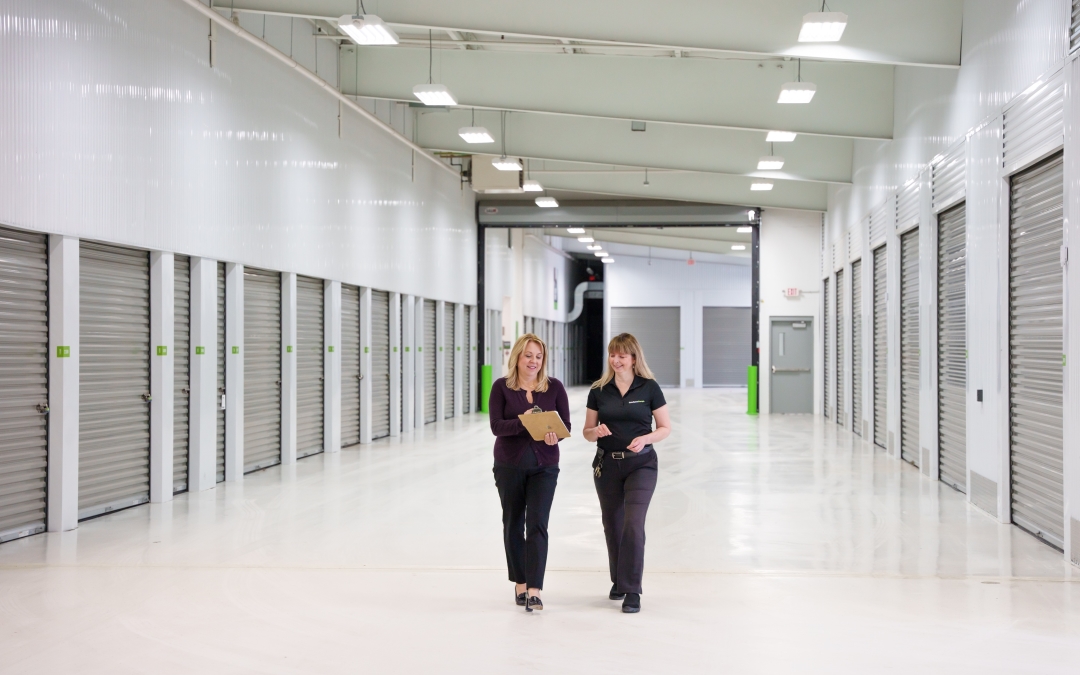Looking for business storage options? Commercial storage solutions have their benefits and drawbacks, so check out this guide on self storage vs warehouse storage to determine which is right for your business!
What Is Self Storage?
Commercial storage units are enclosed rental spaces inside a larger facility, just like personal storage units. Business units come in a variety of sizes but typically range from 5×5 to 10×30, and may offer commercial unit features and amenities like climate control or drive-up access. Here are some pros and cons of renting self storage for commercial use.
Pros
- Renting and insuring a storage unit for business is typically more affordable than renting larger commercial spaces like traditional warehouses.
- With units available in a variety of sizes, you can choose a storage unit size to fit your needs and scale up or down as your business evolves.
- Many business storage units are accessible 24/7, so you can access your items whenever you need them.
- Storage units can often be rented month-to-month, so you can have more flexibility over the length of your commitment.
Cons
- Although there are a range of sizes available, self storage units are smaller than warehouse spaces.
- Certain items are prohibited in storage units, including food, paint, and aerosols.
- Self storage facilities do not typically offer additional services—including more extensive security outfitting.
When to Use Self Storage Units for Business
Storage units are great for small business owners seeking commercial storage for inventory, paperwork, office supplies, and more. If you have minimal to moderate storage needs for your small or local business, renting a commercial storage unit may be your best option.
What Is Warehouse Storage?
Warehouse facilities are large buildings mostly used for commercial storage. Warehouses often come as large as several thousand square feet, and may offer amenities like climate control. Items may be stored on shelving, pallets, or a variety of other methods. Check out this list of pros and cons of renting warehouse storage for your business.
Pros
- Commercial warehouses often offer additional services beyond storage, such as packing and shipping.
- Warehouses have significantly more space and can accommodate large quantities of items.
- Warehouses are more flexible in what you can store, including items not typically allowed in storage units—like shelf-stable food, plants, and aerosols.
- In addition to security features like video surveillance that self storage facilities offer, warehouse security also often includes on-site personnel.
Cons
- Renting a warehouse for business storage is expensive, both in terms of insurance and the actual lease—not to mention services like utilities, labor, and security.
- You often have to rent the entire warehouse, unless you opt for shared warehousing—so you may not be able to scale the amount of space you’re leasing to meet changing storage needs.
- Rental contracts for warehouse storage typically last between three to five years or longer, making them a significant commitment.
When to Use Warehouse Storage for Business
If you have a stable business with a high demand for product and vast amounts of inventory or large items to store, renting a warehouse may be best. However, as an intermediary step, many storage facilities offer warehouse units, which are oversized storage spaces designed for commercial use.
***
Extra Space Storage has a number of business storage options that can accommodate your needs, including small business storage, contractor storage, and business vehicle storage. Find a commercial storage unit near you now!


